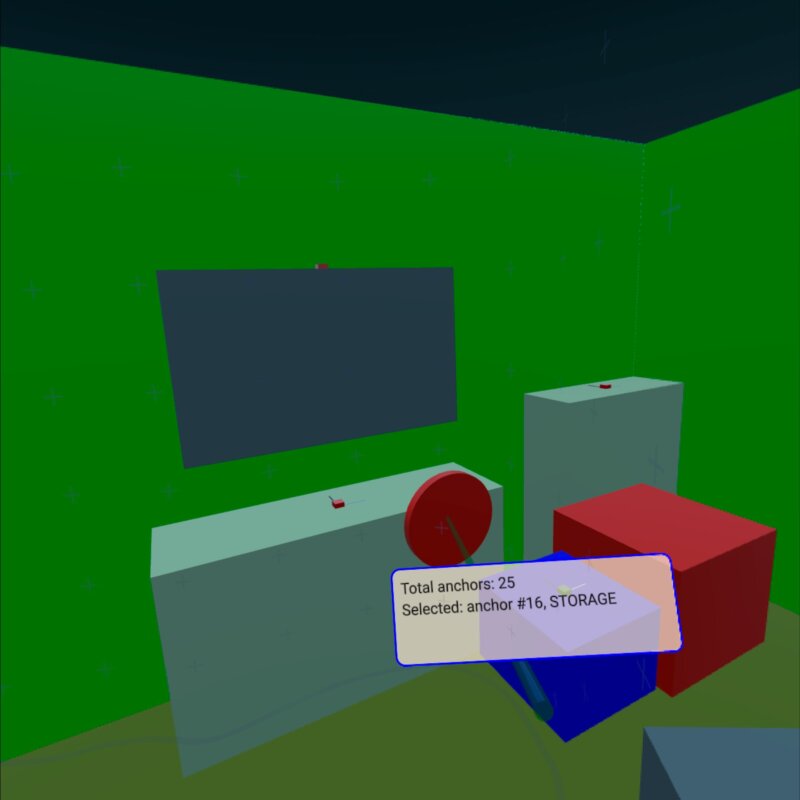Qt Quick 3D - XR 空間アンカーの例
Qt Quick 3D XRで空間アンカーを使用する方法を説明します。

この例では、XrSpatialAnchorListModel を使用して、環境内の実際の物理オブジェクトを表示し、対話する方法を示します。パススルー・モードと完全没入モードの両方をサポートしています。基本的な構造はxr_simpleの例に従っています。
この例の最も関連性のある部分は、XrSpatialAnchorListModel 上のRepeater3D です。各アンカーに対して、アンカーの体積を色で満たすボックスを作成します。色の選択はアンカーの分類に依存する。このボックスはパス・スルー・モードでは見えない。さらに、アンカーの位置と向きを小さなボックスで視覚化する:
Repeater3D { id: spatialAnchors model: XrSpatialAnchorListModel { } delegate: Node { id: anchorNode required property XrSpatialAnchor anchor required property int index position: anchor.position rotation: anchor.rotation Model { pickable: true z: anchorNode.anchor.has3DBounds ? anchorNode.anchor.offset3D.z / 2 * 100 : 0 // Position is center of 2D surface also for 3D anchors scale: anchorNode.anchor.has3DBounds ? anchorNode.anchor.extent3D : Qt.vector3d(anchorNode.anchor.extent2D.x, anchorNode.anchor.extent2D.y, 0.01) materials: PrincipledMaterial { // Make anchor objects invisible in passthrough mode baseColor: xrView.passthroughEnabled ? Qt.rgba(0, 0, 0, 0) : anchorColor(anchor) alphaMode: xrView.passthroughEnabled ? PrincipledMaterial.Blend : PrincipledMaterial.Opaque roughness: 0.7 } source: anchorNode.anchor.has3DBounds ? "#Cube" : "#Rectangle" property string anchorInfo: "anchor #" + anchorNode.index + ", " + anchorNode.anchor.classificationString } Model { // Visualize anchor orientation materials: PrincipledMaterial { baseColor: anchorNode.anchor.has3DBounds ? anchorNode.anchor.has2DBounds ? "green" : "red" : "blue" } scale: Qt.vector3d(0.05, 0.05, 0.05) source: "#Cube" Model { materials: PrincipledMaterial { baseColor: "black" } scale: Qt.vector3d(0.1, 3, 0.1) source: "#Cube" y: 150 } Model { materials: PrincipledMaterial { baseColor: "white" } scale: Qt.vector3d(3, 0.1, 0.1) source: "#Cube" x: 150 } } visible: anchor.has2DBounds || anchor.has3DBounds } }
アンカーのボックスはピッキング可能で、アンカーのclassificationString を含む文字列プロパティanchorInfo を持つ。そして、コントローラの位置に基づいてピッキングを行います。(詳しくはxr_inputの例を参照してください。) アンカーボックスの1つに当たると、アンカー情報のラベルが表示されます:
Node { id: labelNode position: rightController.position rotation: rightController.rotation property int numAnchors: spatialAnchors.count property string anchorInfo: "(no anchor)" Node { y: 15 x: -15 scale: Qt.vector3d(0.1, 0.1, 0.1) Rectangle { width: 300 height: 100 color: Qt.rgba(1,0.9,0.8,0.7) radius: 10 border.width: 2 border.color: "blue" Text { anchors.fill: parent anchors.margins: 10 textFormat: Text.StyledText text: "Total anchors: " + labelNode.numAnchors + "<br>" + "Selected: " + labelNode.anchorInfo + "<br>" + "Press A to Capture/Update anchors" } } } }
© 2025 The Qt Company Ltd. Documentation contributions included herein are the copyrights of their respective owners. The documentation provided herein is licensed under the terms of the GNU Free Documentation License version 1.3 as published by the Free Software Foundation. Qt and respective logos are trademarks of The Qt Company Ltd. in Finland and/or other countries worldwide. All other trademarks are property of their respective owners.

